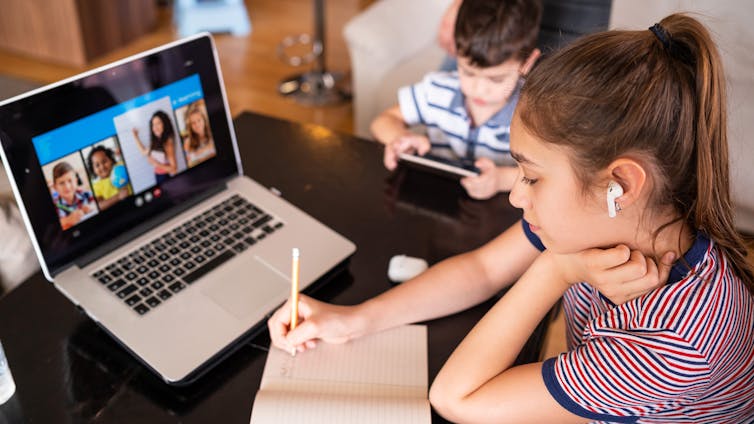3 ways to promote social skills in homebound kids
- Written by Elizabeth Englander, Professor of Psychology, and the Director of the Massachusetts Aggression Reduction Center (MARC), Bridgewater State University
With the severity of the COVID-19 pandemic getting worse in most of the country, a growing number of school districts from San Francisco[1] to Atlanta[2] have determined that a return to daily in-person instruction isn’t yet safe or viable. They aim to to stick with remote learning as the school year gets underway.
Based on my research[3] about the psychological effects of digital technology, I’ve seen that when children and teens spend a great deal of time isolated at home and gazing at screens their social skills[4] and self-esteem[5] can suffer and they may become lonelier[6]. Fortunately, there are ways to lower those risks while young people spend way more time than usual at home.
 Kids who play outside and do things offline are better able to focus on their studies.
Schedivy Pictures Inc./DigitalVision via Getty Images[7]
Kids who play outside and do things offline are better able to focus on their studies.
Schedivy Pictures Inc./DigitalVision via Getty Images[7]
1. Practice paying attention to other people
One important social skill is the ability to pay attention to another person while you’re interacting with them. A long-term study of more than 300 teenagers found that those with the heaviest screen use were also the most likely to focus on their own needs[8], instead of those of the other people they were interacting with. Other research indicates that this self-centered behavior[9] tends to lead to more social problems with friends.
The good news is that regular, daily activities apart from technology can help kids focus in general and pay attention to other people. For example, when families do things together, such as cooking meals and gardening, or have a designated time when everyone reads at the same time, it can help children maintain the social skill of paying attention to others. A large study found that both adults and children engaged in these kinds of activities felt better about their relationships[10].
Kids find it easier to focus on their friends when they play together in person – something that is harder to do while social distancing. And when children play outdoors, or even just spend time outdoors, they become more able to pay attention to their friends and, later on, focus on schoolwork[11]. In addition, yoga and other relaxation exercises[12], such as breathing exercises, can help children practice focusing in general.
 Practicing the art of conversation helps kids who aren’t around their classmates sharpen their social skills.
valentinrussanov/E+ via Getty Images[13]
Practicing the art of conversation helps kids who aren’t around their classmates sharpen their social skills.
valentinrussanov/E+ via Getty Images[13]
2. Foster the give-and-take of conversation
Interactions at school help children learn to read facial expressions and body language, the give-and-take of conversations and how to change or initiate topics of conversation. Having these informal encounters regularly are one way that kids learn how to meet and greet people. While there’s no perfect substitute online, there are steps parents and other guardians can take to help preserve a child’s social skills.
Some online activities can help kids practice perceiving others’ emotions by looking at their faces. One example is the “Eyes In the Mind Test[14],” in which people look at a picture of someone’s eyes and guesses the emotion that person is experiencing.
Family time can potentially make the biggest contribution to conversational and social skills. Plan to eat dinner together, without the distraction of any screens or phones because kids who eat dinner with their families[15] tend to form stronger relationships with their peers, marked by less fighting and bullying.
Writing letters by hand, instead of relying on electronic devices for written communication are helpful too. Parents can encourage kids to find new friends in faraway places through “snail mail,” by taking advantage of a pen pal website[16]. Exchanging letters with a stranger builds conversational skills, since writing a letter to get to know someone involves posing questions such as asking about favorite activities and foods.
 Children of all ages are spending more time gazing at screens.
Thanasis Zovoilis/DigitalVision[17]
Children of all ages are spending more time gazing at screens.
Thanasis Zovoilis/DigitalVision[17]
3. Maintain friendships
Parents of home-bound kids may need to look for creative ways to keep school friendships going. Apps like Skype, Zoom and FaceTime can be useful but children – like adults – can grow tired of them. Fortunately, there are alternatives.
Remind your kids about the difference between brief messages or posts and longer communications. Through my research[18], I’ve found that children generally see the differences between brief but fun interactions versus feeling a deep connection to a good friend. Encourage kids to write longer, but less frequent, messages to their friends because it may help keep those relationships strong.
[Get facts about coronavirus and the latest research. Sign up for The Conversation’s newsletter.[19]]
Despite having to socially distance, don’t forget that children of all ages can also connect with others outdoors, which is safer than being together indoors[20]. Set up outdoor visits that keep children and teens and their friends six feet apart from each other and make sure everyone wears masks[21]. Consider playing croquet[22] or other games that can work with these circumstances or just having them run through sprinklers. Even just a small group of friends hanging out while social distancing can preserve friendships.
Last but not least, encourage teachers to break classes into small groups while they’re learning online. Kids can still learn how to study together, practice skills together, and talk and socialize while they learn outside the classroom.
References
- ^ San Francisco (www.kron4.com)
- ^ Atlanta (www.11alive.com)
- ^ research (scholar.google.com)
- ^ social skills (doi.org)
- ^ self-esteem (doi.org)
- ^ become lonelier (doi.org)
- ^ Schedivy Pictures Inc./DigitalVision via Getty Images (www.gettyimages.com)
- ^ likely to focus on their own needs (doi.org)
- ^ self-centered behavior (doi.org)
- ^ felt better about their relationships (dx.doi.org)
- ^ focus on schoolwork (sophia.stkate.edu)
- ^ yoga and other relaxation exercises (doi.org)
- ^ valentinrussanov/E+ via Getty Images (www.gettyimages.com)
- ^ Eyes In the Mind Test (socialintelligence.labinthewild.org)
- ^ kids who eat dinner with their families (pubmed.ncbi.nlm.nih.gov)
- ^ pen pal website (www.penpalschools.com)
- ^ Thanasis Zovoilis/DigitalVision (www.gettyimages.com)
- ^ Through my research (doi.org)
- ^ Sign up for The Conversation’s newsletter. (theconversation.com)
- ^ safer than being together indoors (www.advisory.com)
- ^ everyone wears masks (theconversation.com)
- ^ playing croquet (www.woodmallets.com)
Authors: Elizabeth Englander, Professor of Psychology, and the Director of the Massachusetts Aggression Reduction Center (MARC), Bridgewater State University
Read more https://theconversation.com/3-ways-to-promote-social-skills-in-homebound-kids-143410

